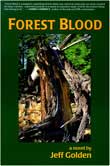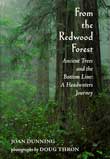The recent high-profile deal to keep chainsaws out of the Headwaters grove of ancient redwood trees near Eureka, Calif., is unlikely to bring about a truce in the raging war over old-growth forest in the Pacific Northwest and northern California. Environmentalists continue to dig in their heels and repudiate all compromise (more than 90 percent of U.S. old-growth has already been lost, they say; no more can be sacrificed). Meanwhile, the timber industry flexes its mighty political muscle and logs on.
Two new books explore the volatile climate in Northwest logging country — a factual first-person narrative and a fictional one.
Joan Dunning takes readers on an impassioned, intimate tour of the Headwaters controversy in her book From the Redwood Forest: Ancient Trees and the Bottom Line: A Headwaters Journey, which came off the presses a few months before the feds and the state of California sealed a deal with Pacific Lumber that has the public paying $480 million to claim ownership of 10,000 acres of old growth. Though Dunning wasn’t able to finish telling the Headwaters story, her rendering of the events leading up to the climax is well worth a read. Doug Thron’s photographs provide striking accompaniment, hammering home the monumental scale of both the redwood trees and the destruction being visited upon them.
Dunning recounts her reluctant conversion from naturalist to activist. After learning about Pacific Lumber’s plans to mow down the Headwaters grove in the same way it had decimated so many other old-growth areas, this self-described mild-mannered mother of two feels compelled to get involved. Much to her own surprise, she soon finds herself speaking at rallies, trespassing on private timber company property, and chatting it up with everyone from Julia “Butterfly” Hill, who has spent more than a year camped out in the branches of an ancient redwood, to Charles Hurwitz, the much-hated corporate raider who made a hostile takeover of Pacific Lumber and dramatically escalated its logging levels.
At times the book is overwrought and sappy, but in all Dunning manages to convey an infectious passion for her cause, a sense of the gravity and urgency of the fight to save our remaining forests. From the Redwood Forest is both heartbreaking and inspiring.

Forest Blood
by Jeff Golden
Wellstone Press, 1999,
300 pages
In Jeff Golden’s novel Forest Blood, logger Jack Gilliam is thrust center-stage in the timber wars after his chainsaw hits a spike planted in a tree, leaving him paralyzed from the waist down. The protagonist tells his own tale of the quiet years that lead up to his fateful day in the woods and the dizzying time that follows, when a media frenzy engulfs him and unanswered questions about the accident swirl around his community.
Golden, a mediator and public radio talk show host, writes in a crisp, clear style and works to craft an even-handed story of timber conflict from the inside. His portrait of a small Oregon logging community is sympathetic and engaging, if a bit overly idyllic, while at the same time he doesn’t shy from portraying the devastation currently being wreaked on Northwestern forests.
Part bildungsroman, part mystery, the book is most successful as it leisurely traces Gilliam’s coming-of-age in a company logging town, showing both a region and a lifestyle in the throes of painful changes. After Gilliam meets with his accident, the story loses some plausibility. He’s cast as the good-hearted, peacemaking logger with strong protective impulses toward riparian zones, while shifty timber company executives, scheming politicians, nosy journalists, and condescending environmentalists circle around him like vultures. Not that it’s any stretch of the imagination to picture Bill Clinton publicly praising Gilliam as a brave hero for the working American, or to envision a ruthless corporate raider (who bares an uncanny resemblance to Hurwitz) pillaging the land. But too many of the ancillary characters fall into stereotypes, and the story is wrapped up too tidily in the end.



